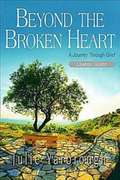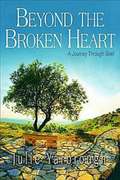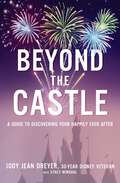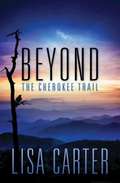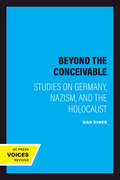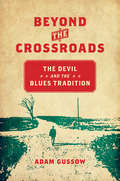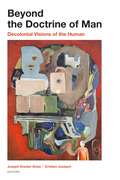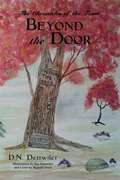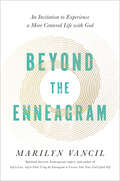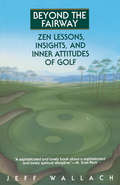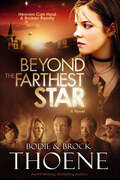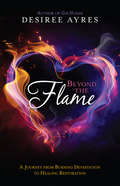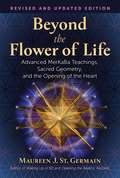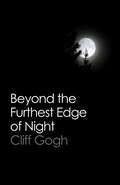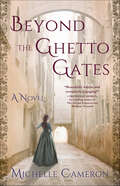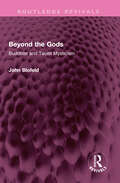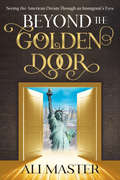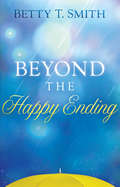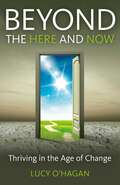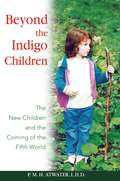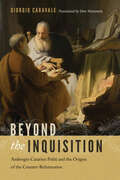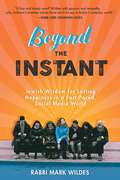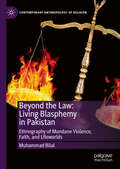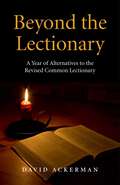- Table View
- List View
Beyond the Broken Heart: Leader Guide
by Julie Yarbrough Gregg MedlynHow does the heart understand grief when it is broken by the death of a loved one? To survive and live forward, those who grieve must find answers. Beyond the Broken Heart is an eight-week support and ministry program for those who are grieving the loss of a loved one. Author Julie Yarbrough chronicles her personal experience combined with a deep love of Scripture and years of leading grief support groups to create an authentic and deeply personal exploration of the grief journey. The Leader Guide includes session plan outlines for eight group sessions to assist leaders in forming and sustaining grief ministry groups. In addition, leaders will find step-by-step instructions to guide them through the group session process and tips for launching, planning, and facilitating a successful group experience. There are also suggestions for creating a group to serve several churches or community programs. "Julie Yarbrough has walked through the valley of the shadow of death and experienced the pain and anguish of great grief, and she knows firsthand the comfort and strength that only God can provide. I commend this remarkable grief ministry program to you highly." James W. Moore, Pastor in Residence, Highland Park United Methodist Church, Dallas, Texas "With wisdom informed by her own experience and a warm regard for those who grieve, Julie Yarbrough guides the brokenhearted on an honest journey toward acceptance and hope. A refreshingly excellent resource for grief support." Stephan Bauman, Senior Minister, Christ Church New York City "Julie Yarbrough weaves understanding, care, and comfort together in such a way that the seemingly intolerable becomes tolerable, one breath at a time. This resource provides everything you need to promote, establish, and conduct grief groups throughout the year." Judith Bone, Director of Adult Discipleship, Brentwood United Methodist Church, Nashville, Tennessee "A gift to those who face the difficult journey through the grieving process. I highly recommend this program, not only for those who have lost, but also for those in the helping professions who offer guidance and counsel to the grieving." Ann Reese, Licensed Marriage and Family Therapist, Licensed Clinical Social Worker
Beyond the Broken Heart: Participant Book (Beyond The Broken Heart Ser.)
by Julie YarbroughHow does the heart understand grief when it is broken by the death of a loved one? To survive and live forward, those who grieve must find answers. Beyond the Broken Heart is an eight-week support and ministry program for those who are grieving the loss of a loved one. Author Julie Yarbrough chronicles her personal experience combined with a deep love of Scripture and years of leading grief support groups to create an authentic and deeply personal exploration of the grief journey. The Participant Book provides eight chapters plus two supplemental chapters that include: · Personal stories/reflections from the author's own journey through grief · Spiritual and practical help for navigating the emotions, experiences, and questions of grief · Scriptures and biblical material appropriate to the themes and topics of each chapter? · Questions for personal reflection with space for recording responses · Readers will transform their experience of grief into a life lived in gratitude for the steadfast love and faithfulness of God and a life that honors the memory of their loved one. "Julie Yarbrough has walked through the valley of the shadow of death and experienced the pain and anguish of great grief, and she knows firsthand the comfort and strength that only God can provide. I commend this remarkable grief ministry program to you highly." James W. Moore, Pastor in Residence, Highland Park United Methodist Church, Dallas, Texas "With wisdom informed by her own experience and a warm regard for those who grieve, Julie Yarbrough guides the brokenhearted on an honest journey toward acceptance and hope. A refreshingly excellent resource for grief support." Stephan Bauman, Senior Minister, Christ Church New York City "Julie Yarbrough weaves understanding, care, and comfort together in such a way that the seemingly intolerable becomes tolerable, one breath at a time. This resource provides everything you need to promote, establish, and conduct grief groups throughout the year." Judith Bone, Director of Adult Discipleship, Brentwood United Methodist Church, Nashville, Tennessee "A gift to those who face the difficult journey through the grieving process. I highly recommend this program, not only for those who have lost, but also for those in the helping professions who offer guidance and counsel to the grieving." Ann Reese, Licensed Marriage and Family Therapist, Licensed Clinical Social Worker
Beyond the Castle: A Guide to Discovering Your Happily Ever After
by Glen Keane Jody Jean Dreyer Stacy L. WindahlWhen the credits roll and you've left the park, when your Disney day is over, how do you take the magic with you into your everyday work and life?Jody Jean Dreyer worked for the Walt Disney Company for 30 years and in Beyond the Castle she shares one-of-a-kind stories and insights into what sets the Disney experience apart, as well as secrets to help readers discover their own “happily ever after.”Beginning with her first position as a summer intern at Walt Disney World, through her role leading synergy and special projects for Disney (reporting to former CEO Michael Eisner), to her work with top leadership at Walt Disney Motion Pictures sharing the magic of Disney films around the world, Jody unpacks secrets that can change the way we understand ourselves, our work and relationships, and how we can find our own path to happiness. You will read her stories about working with Walt’s nephew, Roy E. Disney, her front-line role in the opening of theme parks around the world and her own journey to discovering how to bring some Disney magic into every day.The wish for happy endings is written in our hearts. Every park guest or movie watcher is looking for their own “happily ever after,” as they ask the questions: What’s my story? Does it matter? Will the story end well for me? Jody’s personal experiences and her underpinning faith help her to offer practical and sometimes unexpected principles to better appreciate and navigate our own stories.Jody’s entertaining storytelling will satisfy a reader's desire to open the doors and peek inside the castle – and more, to unlock and illuminate life’s true treasure.
Beyond the Cherokee Trail
by Lisa CarterWhen Linden Birchfield arrives in the Snowbird Cherokee community to organize the 180th commemoration of the Trail of Tears, she runs head on—literally—into arrogant former army sniper Walker Crowe. A descendant of the Cherokee who evaded deportation by hiding in the rugged Snowbird Mountains, Walker believes no good can result from stirring up the animosity with the white Appalachian residents whose ancestors looted the tribal lands so long ago.Though at odds over the commemoration, Linden and Walker must unite against an unseen threat to derail the festival. Together they face an enemy whose implacable hatred can be traced to the events of the Trail, a dark chapter in America’s westward expansion. When called to resurrect his sniper abilities, Walker must thwart the enemy who threatens the modern-day inhabitants of tiny Cartridge Cove—and targets the woman who has captured his heart.
Beyond the Conceivable: Studies on Germany, Nazism, and the Holocaust (Weimar and Now: German Cultural Criticism #20)
by Dan DinerThe major essays of Dan Diner, who is widely read and quoted in Germany and Israel, are finally collected in an English edition. They reflect the author’s belief that the Holocaust transcends traditional patterns of historical understanding and requires an epistemologically distinct approach. One can no longer assume that actors as well as historians are operating in the same conceptual universe, sharing the same criteria of rational discourse. This is particularly true of victims and perpetrators, whose memories shape the distortions of historical narrative in ways often diametrically opposed.The essays are divided into three groups. The first group talks about anti-Semitism in the context of the 1930s and the ideologies that drove the Nazi regime. The second group concentrates on the almost unbelievably different perceptions of the "Final Solution," with particularly illuminating discussions of the Judenrat, or Jewish council. The third group considers the Holocaust as the subject of narrative and historical memory. Diner focuses above all on perspectives: the very notions of rationality and irrationality are seen to be changeable, depending on who is applying them. And because neither rational nor irrational motives can be universally assigned to participants in the Holocaust, Diner proposes, from the perspective of the victims, the idea of the counterrational. His work is directed toward developing a theory of Holocaust historiography and offers, clearly and coherently, the highest level of reflection on these problems.
Beyond the Cross and the Switchblade
by David WilkersonFrom the Book Jacket: uthor, David Wilkerson, what has happened since its publication in the early 1960s. Their gratifying interest in his story and his ministry has prompted him to bring his many readers up-to-date with a fitting sequel-and BEYOND THE CROSS AND THE SWITCHBLADE is just the book we've all been waiting for. Here is a nostalgic look back at memorable characters from the original book and a brief review of what they're doing today. We are treated to a behind-the- scenes look at the making of the movie version of THE CROSS AND THE SWITCHBLADE, starring Pat Boone, and find that, surprisingly, the venture brought fame but not fortune. The publicity accompanying the book and the movie turned the skinny preacher from Pennsylvania into a reluctant celebrity, and eventually forced him to withdraw from the rat race for a while. Only then was he able to place things in their proper perspective-waiting upon "Holy Ghost timing," as he puts it-thus renewing his person-to-person ministry that had been temporarily sidetracked by other commitments. The past decade was filled with many ups and downs for the entire Wilkerson family, and David frankly recounts it all: his wife Gwen's gallant bout with cancer, his brother Jerry's now- conquered battle with alcoholism. Yet BEYOND THE CROSS AND THE SWITCHBLADE is far more than reminiscences of THE CROSS AND THE SWITCHBLADE; it is a very now book in which David Wilkerson speaks directly to the most pressing needs of today. A large portion of the book is concerned with the phenomenon of drugs in the suburbs. Unfortunately, in the years since David Wilkerson labored for the Lord in the back alleys of the ghettos, drug use has spread to the backyards of suburbia. A chapter is devoted to the related subject of the forgotten teen-agers, those good, clean-cut kids of relative affluence who nevertheless have many serious problems and who need to come to Jesus just as desperately as their more publicized contemporaries, the juvenile delinquents. All in all, David Wilkerson's Teen Challenge is constantly redirecting itself to meet these new challenges. Throughout, spiritual lessons intermingle with heartwarming human interest episodes to imbue BEYOND THE CROSS AND THE SWITCHBLADE with that singular, "can't put it down" quality that marks a sure-fire best seller. The Trusting Place Two Odd "Success" Stories The Day I Quit the Rat Race Drugs in the Suburbs The Forgotten Teen-Ager The Fear I Couldn't Conquer
Beyond the Crossroads: The Devil and the Blues Tradition (New Directions in Southern Studies)
by Adam GussowThe devil is the most charismatic and important figure in the blues tradition. He's not just the music's namesake ("the devil's music"), but a shadowy presence who haunts an imagined Mississippi crossroads where, it is claimed, Delta bluesman Robert Johnson traded away his soul in exchange for extraordinary prowess on the guitar. Yet, as scholar and musician Adam Gussow argues, there is much more to the story of the devil and the blues than these cliched understandings.In this groundbreaking study, Gussow takes the full measure of the devil's presence. Working from original transcriptions of more than 125 recordings released during the past ninety years, Gussow explores the varied uses to which black southern blues people have put this trouble-sowing, love-wrecking, but also empowering figure. The book culminates with a bold reinterpretation of Johnson's music and a provocative investigation of the way in which the citizens of Clarksdale, Mississippi, managed to rebrand a commercial hub as "the crossroads" in 1999, claiming Johnson and the devil as their own.
Beyond the Doctrine of Man: Decolonial Visions of the Human
by Joseph Drexler-Dreis and Kristien JustaertCatalyzed by Sylvia Wynter’s questioning of modern/colonial descriptions of the human person, the essays in Beyond the Doctrine of Man interrogate the problem of these definitions of the human person and take up the struggle to decolonize and unsettle such descriptions.Contributors: Rufus Burnett Jr., M. Shawn Copeland, Yomaira C. Figueroa, Patrice Haynes, Xhercis Méndez, Andrew Prevot, Mayra Rivera, Linn Marie Tonstad, Alexander G. Weheliye
Beyond the Door: The Chronicles of the Team
by D.N. DettwilerTravel to the future...3030, to meet the Team, a group of friends determined to love not only each other but those that hate them the most. What will become of their convictions under fire? Will they truly give it all, or will their good intentions fall flat? And what if it is all for nothing?
Beyond the Enneagram: An Invitation to Experience a More Centered Life with God
by Marilyn VancilStep into the transformative life God invites you to enjoy, using the wisdom of the Enneagram paired with fresh tools and insights.&“If you long to be free from the coping mechanisms that keep you stuck, this is the book for you!&”—Amy Wicks, Enneagram life coach for female entrepreneursFor more than thirty years, Marilyn Vancil has studied, written about, and taught the Enneagram. She knows full well how using this system of nine personality types in combination with deep scriptural truths can lead people to a life of freedom. Now Vancil offers a way to deeper wholeness beyond the classic Enneagram.Vancil proposes an enhancement, called The Drawing, which includes the Enneagram&’s wisdom &“but also focuses inwardly toward the center space and extends beyond the existing circle. . . . As with other spirals and circles to illustrate the spiritual life, the primary movement of The Drawing is toward the middle space, our Spiritual Center, the transcendent way of knowing beyond the more commonly recognized Centers of the Gut, Heart, and Head used to categorize the Enneagram types.&” The Drawing depicts the holy attraction of our spirits toward God&’s spirit as our ultimate destiny.Vancil presents these sacred shifts to lead us from debilitating self-orientation to God-centered living:• from What I Am to Who I Am• from Reactive to Responsive• from Bondage to Freedom• from Wounded to Whole• from Shakable to Unshakable• from Burdened to RestedThe wisdom and practical steps that Marilyn Vancil provides will lead you to places of profound spiritual discovery and help you chart a course toward the wiser, more spiritually attuned person you long to become.
Beyond the Fairway: Zen Lessons, Insights, and Inner Attitudes of Golf
by Jeff WallachBeyond The Fairwayis a guide for getting to the heart of golf and self by measuring a not by the score, but by the overall experience. Going against conventional approaches to golf, disproving that a straight fairway drive is golf's ultimate thrill, golfer and author Jeff Wallach steers his cart into the rough and even dangerous terrain where golf becomes an adventure into the unknown, into the greater mysteries of life, love, friendship, endurance, being a son, and being a man. Each chapter presents the unique physical and spiritual challenges of exotic and exclusive courses around the world from Scotland, Africa, and Thailand to Oregon, Alaska, and Nepal. The book gives an insider's often humorous, sometimes irreverent perspective on the sacred sites and rites of golf, and pros from around the world provide practical tips and insights into the game.
Beyond the Farthest Star: A Novel
by Bodie Thoene Brock ThoeneWhen a nativity display on public property is torched by a former US Senator, the media spotlight falls on the forgotten small town of Leonard, Texas, and the new pastor of its only church—Adam Wells. Emboldened by the prospect of leading his tiny congregation in a nationally-televised, first amendment debate that he considers to be a “fight for the heart and soul of America,” Pastor Wells determines not to let anything or anyone, including his wife and his rebellious sixteen-year old daughter, stand in his way. But when an old high school friend unexpectedly shows up in their small town and a past secret is revealed, Pastor Wells’ constitutional crusade collides with an even greater fight—the fight for the heart and soul of his marriage, his daughter, and, even his own life. In this modern-day story of betrayal, forgiveness, and finally redemption, Adam Wells discovers, for the first time, the meaning of the story he’s been preaching all his life…and his desperate daughter understands what really is beyond the farthest star. Award-winning authors, Bodie and Brock Thoene, have written an emotional and authentic drama based on a screenplay by Andrew Librizzi and now a major motion picture.
Beyond the Flame: A Journey from Burning Devastation to Healing Restoration
by Desiree AyresTen days after a terrible explosion left her fighting for her life, Hollywood stuntwoman Desiree Ayres walked out of the Sherman Oaks Burn Center completely healed and whole. Today she is on fire for God, sharing her powerful testimony of miraculous healing and restoration with everyone she meets. What are you trusting God for? Physical healing? A financial miracle? Nothing is too big for God--what He did for Desiree, He will do for you. Beyond the Flame will encourage you to stand on the promises of God’s Word, speak life into your situation, and claim your miracle.
Beyond the Flower of Life: Advanced MerKaBa Teachings, Sacred Geometry, and the Opening of the Heart
by Maureen J. St. Germain• Includes tools and techniques to permanently elevate and program your MerKaBa field, including how to create surrogate MerKaBas for specific purposes • Explains how to accurately connect with your Higher Self to live fearlessly and confidently and shares toning, chanting, and heart-opening practices to acquire unconditional love energy and heal emotional wounds • Looks at paranormal experiences resulting from an activated MerKaBa, the power of Mother Earth ley lines, and the Christ Consciousness Grid Through teaching MerKaBa and Advanced Flower of Life workshops to thousands of students around the world since 1995, Maureen J. St. Germain has developed and channeled specific methods to enhance your meditation practice. In this step-by-step guide, she shares tools, techniques, and knowledge to strengthen your heart connection, develop a relationship with your Higher Self, and elevate and program your MerKaBa field to manifest success, health, happiness, and higher consciousness. She begins by explaining what the MerKaBa is: a fifth-dimensional Light Body activated from the geometric energy field that exists around the body. She shows how activating it daily produces its permanent existence. Sharing toning, chanting, and heart-opening practices, Maureen explains a precise protocol for fully and reliably connecting with your Higher Self, which will allow you to go through life fearlessly and confidently. She explores how to write programs for your MerKaBa and how to create surrogate MerKaBas for specific purposes. She also looks at paranormal experiences resulting from an activated MerKaBa, the power of Earth ley lines, the Christ Consciousness Grid, and how to marry the ego to the Higher Self to create Heaven on Earth. An updated resource for meditation practitioners and anyone who wishes to improve their connection with their divinity, this new edition of Beyond the Flower of Life provides a path to open your heart, fearlessly embrace unconditional love, access the Higher Self, and activate a multidimensional understanding of reality.
Beyond the Furthest Edge of Night
by Cliff GoghTo quiet his existential horror, a brooding young man seeks to understand life. Cliff Gogh is out in the dark, a solitary ghost examining himself in the night, with all of his mental faculties directed toward the intangible, pain, darkness, despair, fearlessness, love, and the incomprehensibly vast.
Beyond the Ghetto Gates: A Novel
by Michelle CameronWhen French troops occupy the Italian port city of Ancona, freeing the city’s Jews from their repressive ghetto, it unleashes a whirlwind of progressivism and brutal backlash as two very different cultures collide. Mirelle, a young Jewish maiden, must choose between her duty—an arranged marriage to a wealthy Jewish merchant—and her love for a dashing French Catholic soldier. Meanwhile, Francesca, a devout Catholic, must decide if she will honor her marriage vows to an abusive and murderous husband when he enmeshes their family in the theft of a miracle portrait of the Madonna. Set during the turbulent days of Napoleon Bonaparte’s Italian campaign (1796–97), Beyond the Ghetto Gates is both a cautionary tale for our present moment, with its rising tide of anti-Semitism, and a story of hope—a reminder of a time in history when men and women of conflicting faiths were able to reconcile their prejudices in the face of a rapidly changing world.
Beyond the Gods: Buddhist and Taoist Mysticism (Routledge Revivals)
by John BlofeldFirst published in 1974 Beyond the Gods argues that true mystics transcend religious boundaries, and that Eastern mysticism has increasing relevance for the troubled minds and spirits of the West. Blofeld’s approach is a highly personal one based on encounters with monks, lamas, and recluses in their mountain retreats. He also includes a vivid description of the Chinese religious scene and chapters on the mystical practices of Taoism, Ch’an (Zen) and the Tantric Buddhism of Tibet. The book seeks to answer broader questions like – what has Eastern mysticism to offer the West, how can we free ourselves from the pressures of modern life or benefit from eastern methods of cultivating the sublime mystical experience? This is an interesting read for scholars and researchers of Buddhism, Taoism, and religion in general.
Beyond the Golden Door: Seeing the American Dream Through an Immigrant's Eyes
by Ali MasterIn this powerful and inspiring memoir, a Pakistani immigrant shares his story of finding new freedoms and a new faith in America.It&’s easy to talk about freedom. But unless someone has lived in a world that suffocates freedom, it&’s difficult to appreciate the liberty found in America. This is the true story of a Pakistani Muslim who immigrates to the United States for college and discovers five transformational freedoms along the way: the freedom to fail and start over, to love, to choose one&’s faith, to be an entrepreneur, and to self-govern.Contrasting these precious freedoms with the life he lived in Pakistan, Ali&’s story reveals that God is the true source of liberty as He works in people&’s lives to bring about redemption. A call to value and preserve American freedoms, Beyond the Golden Door is also an invitation for readers to consider ultimate freedom in Jesus Christ.
Beyond the Happy Ending
by Betty Smith“The fulfillment of dreams and promises kept does not signal that the dance is over. The music plays on and we dance until our Father says it’s time to go home. Sometimes we even dance in the rain, but that’s OK. We’re going beyond!” --Betty T. Smith When God makes a promise, His fulfillment always exceeds our expectations. Once we submit to His calling, He takes us beyond our comfort zone into the fullness of life in Christ. Just as parents delight in watching their children grow, God longs to watch His precious children mature and learn to trust Him, pray and read the Word, and seek His will for our lives. Beyond the Happy Ending encourages each of us to trust God, and to believe in the life-changing power of prayer. Betty Smith has witnessed reconciliation, restoration, healing and miracles in her own life and in the lives of others. God not only fulfilled His promise to restore her marriage, but He also opened doors and granted divine opportunities for her to travel around the world, bringing the love and message of Christ to people in ways that she could never have imagined.
Beyond the Here and Now: Thriving in the Age of Change
by Lucy O'HaganBeyond the Here & Now is an account of how we have come to be where we are now, in the modern era. In explaining the things that have not served us well we can uncover how to put them right in order, if we choose, to bring about a way of experiencing this world, and each other, as never before. No need for great blind leaps of faith or trickery, as the book demonstrates, everything we need is already at hand. We must now apply what we inherently know and this book explains how.
Beyond the Indigo Children: The New Children and the Coming of the Fifth World
by P. M. AtwaterConnects the arrival of a new type of children with the fulfillment of the Fifth World of the Mayan Calendar and other great prophecies • Provides detailed information about the world changes that will take place before and after December 21, 2012 • Explores the seven "root races" representing the genetic gene pool of the human family and the phenomenon of soaring intelligence • Explains the grand sweep of human evolution and the worldwide ascension of energy now occurring, which will take humanity to the next level of development According to prophecy, the fifth sun or fifth world of the Mayan calendar moves into a higher octave of vibration, or ascension, on December 21, 2012. This date represents a "gateway" of planetary development that will open humanity to new ways of living and new worlds of opportunity. Ancient traditions have foretold that our successful passage through this gateway depends on the "fifth root race"--new stock in the human gene pool--destined to help us through the exciting and massive changes ahead. In Beyond the Indigo Children P. M. H. Atwater illuminates the characteristics of the fifth root race, the capstone being the extraordinary "new children," those brilliant and irreverent kids born since 1982. She explores the relationship of the new children to the prophecies in the Mayan calendar and other traditions, providing extensive background information about the seven root races (the sixth and seventh of which haven’t yet appeared) and the great shifting of consciousness already underway. She reveals the connection of the seven root races to the seven chakras, and how the fifth chakra--the chakra of willpower--will be opened for humankind as the new children grow to maturity. She also discusses the phenomenon of soaring intelligence and undeveloped potential and provides concrete guidance and tools for those who seek to understand and help the new children achieve their full potential. Beyond the Indigo Children is the first major study of today’s children, and their place in our rapidly changing world, that combines objective research with mystical revelation and prophecy.
Beyond the Inquisition: Ambrogio Catarino Politi and the Origins of the Counter-Reformation
by Giorgio CaravaleIn Beyond the Inquisition, originally published in an Italian edition in 2007, Giorgio Caravale offers a fresh perspective on sixteenth-century Italian religious history and the religious crisis that swept across Europe during that period. Through an intellectual biography of Ambrogio Catarino Politi (1484–1553), Caravale rethinks the problems resulting from the diffusion of Protestant doctrines in Renaissance Italy and the Catholic opposition to their advance. At the same time, Caravale calls for a new conception of the Counter-Reformation, demonstrating that during the first half of the sixteenth century there were many alternatives to the inquisitorial model that ultimately prevailed. Lancellotto Politi, the jurist from Siena who entered the Dominican order in 1517 under the name of Ambrogio Catarino, started his career as an anti-Lutheran controversialist, shared friendships with the Italian Spirituals, and was frequently in conflict with his own order. The main stages of his career are all illustrated with a rich array of previously published and unpublished documentation. Caravale's thorough analysis of Politi's works, actions, and relationships significantly alters the traditional image of an intransigent heretic hunter and an author of fierce anti-Lutheran tirades. In the same way, the reconstruction of his role as a papal theologian and as a bishop in the first phase of the Council and the reinterpretation of his battle against the Spanish theologian Domingo de Soto and scholasticism reestablish the image of a Counter-Reformation that was different from the one that triumphed in Trent, the image of an alternative that was viable but never came close to being implemented.
Beyond the Instant: Jewish Wisdom for Lasting Happiness in a Fast-Paced, Social Media World
by Mark WildesMore than ever, young people today are searching for a sense of purpose and direction. Advances in science and technology have given our generation opportunities our grandparents could only dream of, yet our need for meaning and values is more unfulfilled than ever. Growing addiction to instant gratification and attachment to circumstantial highs leave us lacking when it comes to long-term contentment.Beyond the Instant shows young adults how to enrich their lives through faith. It examines ten different areas of contemporary life, including friendship, family, dating, money, and career, to demonstrate how a return to spirituality can help people find happiness and satisfaction. It addresses many important questions along the way: What is the true role of sex in relationships? What is the significance of failure? How can people really make a difference in the world? In the book, Rabbi Mark Wildes draws upon Jewish tradition and wisdom to bring a sense of balance, stability, and purpose to the often frenzied and occasionally directionless twenty-first-century way of life. Each chapter examines what the Torah has to say about a particular concern of modern life and then shows how thousands of years of rabbinical teachings can be applied to the contemporary situation. Written in a relatable and engaging style, it shows how faith and religion can provide a practical guide to finding happiness that goes beyond the instant.
Beyond the Law: Ethnography of Mundane Violence, Faith, and Lifeworlds (Contemporary Anthropology of Religion)
by Muhammad BilalThe book embarks on a journey into the intricate landscape of blasphemy in Pakistan amid a rising tide of blasphemy accusations, public lynchings, and contentious blasphemy laws. Challenging conventional perspectives, this book delves beyond legal and religious confines, offering an ethnography of the mundane as a secular reading and a grand existential scheme to highlight how blasphemy laws and religious prisms often fail to capture the essence of the blasphemy dilemma in Pakistan. The author offers an insightful re-evaluation of the blasphemy issue, addressing its multifaceted definition, the motivations driving intentional blasphemous acts and frivolous accusations, the authority to punish alleged offenders, the paradox of religious violence, and the emergence of mediated expressions and virtual negotiation of blasphemy. Through meticulous grassroots analysis of ordinary Pakistanis’ perspectives, the book offers pragmatic policy solutions for blasphemy issues, presenting unorthodox insights into Pakistan, its diverse populace, and the ever-evolving sensibilities of Islam and societal dynamics in both local and global contexts.
Beyond the Lectionary: A Year of Alternatives to the Revised Common Lectionary
by David AckermanBeyond the Lectionary gives preachers a new year of Biblical texts that are not found on Sundays (or other mainline Protestant holy days) in the three-year cycle of the Revised Common Lectionary. It provides readings from the Hebrew Bible, Psalms, Epistles/New Testament and Gospels for each Sunday of the liturgical year, along with several midweek observances. The texts have been selected with an eye toward continuity (progressing in order) and complementarity (textual completion or harmony), and they are accompanied by commentaries and prayers. Written in language that is accessible to both lay people and professionals, Beyond the Lectionary has the potential to transform congregational culture by bringing more of the content of scripture to people's awareness.
